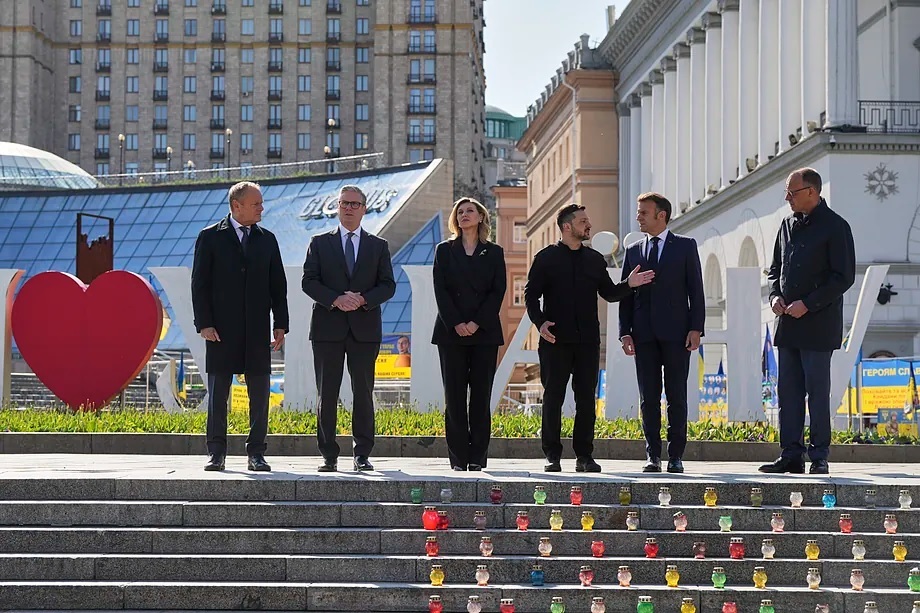The leaders of four of the most powerful European countries arrived in Kiev on Saturday in a joint show of support as calls to Russia to accept a one-month ceasefire in the war, proposed by Donald Trump, and already accepted by Volodimir Zelenski. The heads of state of France, Germany, Poland, and the United Kingdom arrived together at the train station in the Ukrainian capital, where they have a meeting with the president. Keir Starmer; Germany, Friedrich Merz, and Donald Tusk passed through Maidan Square to pay tribute to the fallen fighters on the battlefields, each represented by a flag.
This is the first joint visit of the leaders of the four countries to Ukraine and the first of Friedrich Merz as the new Chancellor of Germany. "We reiterate our support for President Trump's peace agreement calls and make another appeal to Russia to stop obstructing efforts to ensure lasting peace," they stated in a joint declaration. The German Chancellor later warned, in a press conference, that there will be a "drastic increase in sanctions" against Russia if its president, Vladimir Putin, does not accept the 30-day ceasefire to enter peace negotiations.
This visit is also an attempt to counter the support that Vladimir Putin received from leaders, mostly dictatorial, who gathered in Red Square to attend the military parade on May 9th for the 80th anniversary of World War II. "A fair and lasting peace begins with a complete and unconditional ceasefire," Macron wrote upon his arrival in the Ukrainian capital. "This is the proposal we made together with the United States," added Macron, who recalled that Ukraine agreed to lay down arms for a month on March 11 and accused Russia of "procrastinating" by setting conditions to "buy time" and continue the war.
Macron added that "if Moscow persists with its blockade," pressure on Russia by Europeans will increase "in close coordination with the US." "We welcome Trump's call to take this step," he added. If the ceasefire does not begin after the weekend, he continued, "there will be a drastic increase in sanctions and there will continue to be strong support for Ukraine, both politically and financially and militarily. The US would support this increase. Donald Trump is evidently losing patience with Putin," he said.
Meanwhile, the President of the European Commission, Ursula von der Leyen, expressed support for a proposed unconditional 30-day ceasefire in Russia's war against Ukraine, stating that the EU is prepared to impose more sanctions on Russia if the ceasefire is violated. "The ball is now in Russia's court," von der Leyen wrote on the social network X.
In this case, Ukraine also calls them as part of the "Coalition of the Willing," meaning those countries that wish to have a role in peace management, even sending a stable military force to the country, as the French and British intend.
In Europe, there are not many illusions about the true intentions of the Kremlin. Its spokesperson, Dmitry Peskov, stated on Saturday: "We reject the idea of a 30-day ceasefire proposal if Kiev's allies continue to supply it with weapons. It would be an advantage for Ukraine. It will use this time to train new troops and give rest to those already fighting." In other words, Moscow can arm itself with its allies Iran and North Korea, but does not want to allow Kiev to do so with the West.
The head of the Presidential Office of Ukraine, Andriy Yermak, stated that Ukraine is in active consultations with the United States, the United Kingdom, France, Germany, and the Nordic countries regarding a proposed one-month ceasefire, raised during a call two days ago between Trump and Zelenski. If Russia rejects it, Kiev and its allies plan a new phase of intensified pressure, including tougher sanctions. "Ukraine's stance is proactive. The goal is not only to stop the war but to ensure a lasting peace with binding security guarantees," he added.
In recent days, the European Union and its partners have engaged in extensive diplomatic efforts to pressure Russia to accept the end of its aggression against Ukraine and to accept the ceasefire. Yesterday, Kaja Kallas, the EU's foreign policy chief, initiated the establishment of a Special Tribunal to prosecute Russian war crimes in Ukraine.
The US Embassy in Kiev has issued a concerning alert about the possibility of intercontinental missile launches, such as the Oreshnik, in the next two or three days towards the Ukrainian capital, and has urged its citizens to leave. Meanwhile, Russia has closed the airspace around Kapustin Yar, one of the missile launch bases, which may have nuclear capabilities.
